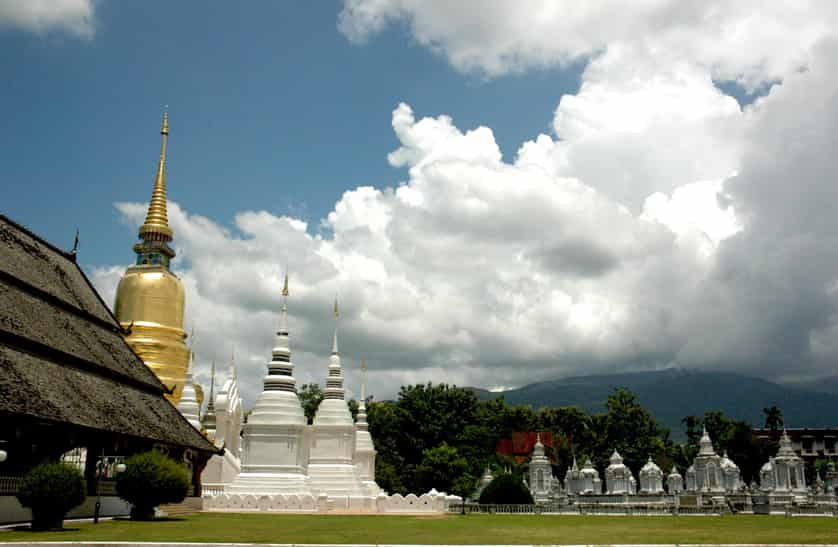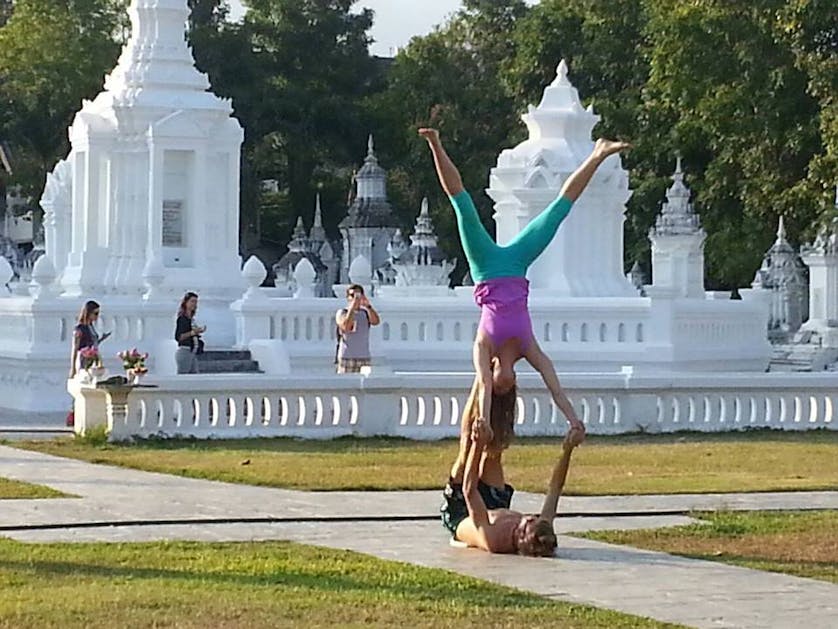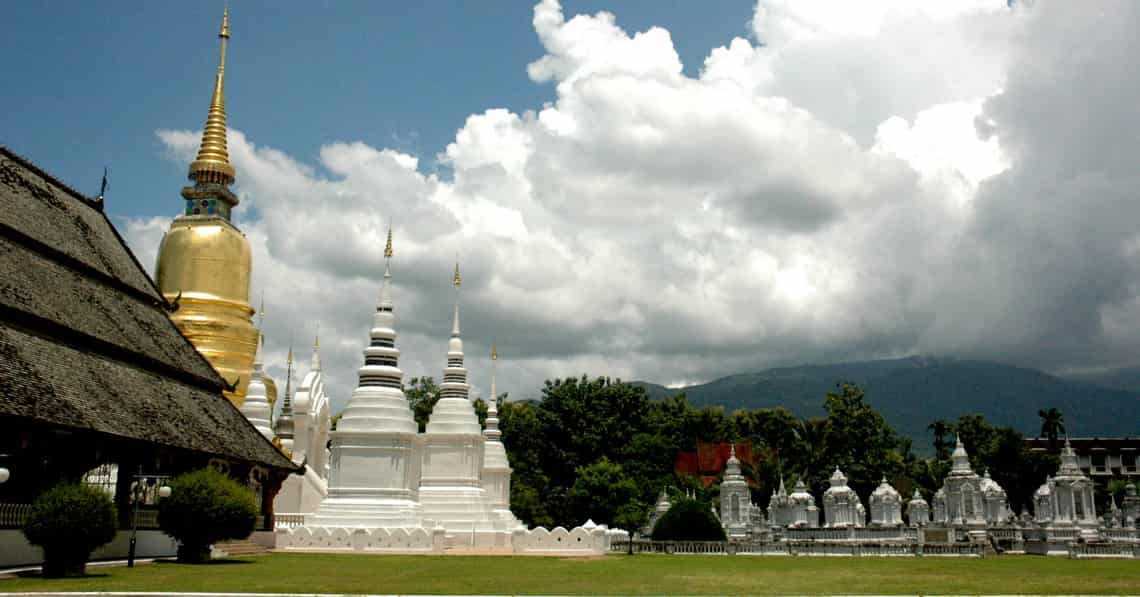There is one thing I know with absolute certainty after having been in the Land of Orange Robes for two weeks; I know nothing about Buddhism. This is coming from a girl who has been practicing meditation for over a year and a half, from a girl with two quite close Buddhist friends and from a girl who read several books and watched various documentaries about the religion and its practices. Still, having now been here a few weeks, I have to admit to knowing absolutely nothing, which is quite embarssing to discover especially after having come into contact with the religion in so many ways and even more so after having pitched a story about the backpacker Buddhism phenomenon to my editor.

Soon after this realisation dawned on me I started feeling slightly guilty because I practice mediation but actually do not understand the theory behind the practice at all. I do know a lot about the ancient holistic practice from a western standpoint of view, from scientifically conducted research involving brain scans of monks and similar experiments, from the deep discussions we have between practicing different kinds of meditations at my evening class and from various books, which are, however,mostly written by authors based in the states or in Europe.
Prior to my arrival I felt that maybe I would be judged by Thai people and by monks for practicing meditation while not having any sort of real background knowledge about that practical element of Buddhism. Maybe they would feel insulted even, I feared. Tons of tourists are coming to Asia with the idea of being experts in mediation or any other Buddhist related practice when, in fact, the knowledge of most of us travellers is based on information about westernised practices which are simplified and tweaked in order to appeal to a modern mainstream society and have little to do with the original, ancient practices.
When my colleague told me about the incident that happened at Suan Dok temple in December 2014, when young backpackers practiced yoga outside this sacred temple, wearing very tight and revealing yoga clothes, such as tank tops, and thereby exhibiting a lack of understanding and respect towards local customs, causing a social media storm of outrage here in Thailand, I began to fret even more. When thinking about this more closely, it is very apparent though, that there is a rather big difference between a lack of deep knowledge and a willing or unwilling lack of awareness of the customs of the country you are travelling through, which results in possible disrespectful behaviour towards that culture.
After hearing about this incident I felt even more uncomfortable to write this article than before because A: I do not only feel I have a clue what exactly Buddhism actually is but B: I seem to embody a stereotypical backpacker more than I thought; European student in her early twenties, taking meditation and yoga classes in a fancy gym back home in London, booking a trip to Thailand, alone, to complete an internship, visit a retreat and later island hop in the hope to experience that magical freedom, be it of spiritual nature or not, other young travellers cannot stop raving about when they come back from their quest of self discovery.
Absorbed in my worries, to a point where not even meditation could help me feel centered and calm again, of possibly very unwillingly having slipped into the role of an arrogant twenty something backpacker who is definitely not equipped to write an article about Buddhism, in the hope that my Chinese flat mate would be able to help me rebuild my lost self esteem and help me regain my confidence so I could write the article, I started bombarding her with a series of desperate text messages, nearly begging her to reassure me I was equipped to tackle this piece. A few minutes into the conversation, however, she texted back: “Andrina, everything you think you know about my religion is wrong. I do not know where to start to correct you.”
After having received that message I thought I had to go back to square one. Before falling asleep that night, however, I did realise that my utter lack of understanding is not what defines me. What defines me is my awareness of it and as far as I was concerned, I was not only very aware of it but also felt guilty and, what is even more important, I wanted to change that current state of my cluelessness.
This realisation gave me the needed confidence to visit one of the monk chats Chiang Mai is so famous for to once and for all to find out what a real monk has to say in regards to my backpacker Buddhism dilemma.
I cycled across town and was soon locking my pink bicycle to a metal pole near Wat Chedi Luang. I took a fortifying sip from my already warm water and tried to cross the incredibly busy road in order to get to the entrance of the temple. My heart was beating faster than it usually does. I do not like talking to strangers, even less so when I am not sure what their reaction to my questions will be. I slowly walked past the temple and towards the big dark green tree underneath the welcoming shade of which a handful of round stone tables were set up for the monk chat. A few young monks, probably in their early twenties like myself, sat in the shade talking and laughing amongst one another. When they saw me cautiously approaching, one of them smiled at me expectantly and pointed to the stone bench opposite the table from him. I walked over, greeted him with a wai and sat down. Although, according to every single personality test I have ever taken, I am 100% introvert, and do not like to start conversations, especially with strangers, this monk’s presences put me at ease immediately. His smile was so welcoming, comforting and incredibly genuine like no smile I have ever received before. He asked me several questions such as where I was from, how long I would be in Thailand for and other small talk classics. When he wanted to know what brought me to the monk chat, I started to explain to him the dilemma I have been thinking about so often since having arrived in Thailand.
He seemed baffled, almost irritated, that I was even wasting time thinking about something that, to him, seemed to be an absolute no brainer: “How can it be a bad thing?”, he asked, shrugging his shoulders and smiling at me expectantly. This was his simple response to my rather long and complex question as to whether or not he was okay that such a vast amount of Westerners, including me, practice meditation, or any other element of his religion, that has been removed from its original context, without knowing any of the theory supporting these practices, nor even considering that there might be the option to convert.

He understood that my silence meant that I was not satisfied with his simple answer and he went on to offer me a more complex response: “Getting to know yourself, improving yourself, beginning to understand how to be happier, more at peace, how to forgive others and most importantly, forgive yourself, and essentially change your attitude towards other people and towards life, that is not a bad thing, is it?,” he asked me.
I had to smile a bit at myself because what did I expect a Buddhist monk to do other than give me such a kind and simple answer? This inspiring exchange between the monk and myself seemed to just be an interesting conversation between two people, one telling the other how he is so balanced, so calm and at peace and explaining to the other how she can be it too– without ever wanting her to convert but simply with the best intentions for her well-being at heart. Yet, the monk did not value that conversation as a waste of time but seemed to enjoy it so much that he even offered me an ice cold soda.
The reason why he is more than okay with people just learning more about the practical elements of his religion and ignoring the theoretical part is that this ’positive inner shift’, as he described it earlier, ’can only be achieved through practice’. The theory behind the practice and Buddhism as a whole, helps understanding and deepening the practice. ’The theory, however, will not do the meditation for you’, he laughed. So if one wants to work on himself, change his mindset, it is only him who can through practice facilitate this positive shift in his attitude. No books, no studying of any theory can ever replace this practical aspect that is the key to getting to know and change oneself.
During our what seemed hour long conversation, a shy Chinese girl sat onto the bench next to me and started asking questions. He would later explain to me that those are, “the easy questions”; why monks’ robes have different colours and why their heads are shaved. (So if you would like to go to a monk chat and have a seriously inspiring and interesting exchange with a monk, take the tip of an open minded backpacker and google the basics beforehand and try to ask very unexpected questions to spark a unique conversation that both parties can equally enjoy.)
This quick interaction between the Chinese girl and the monk made me realise that I should have never even been concerned about the fact that I seem to know absolutely nothing about Buddhism. Although, I am just one of many young adults that flock to Thailand in masses every year, I realised that there is a huge difference between the attitude, behaviour and self image of every traveller. As long as I apply the principles learned during my meditation practice, have an open mind, am ready to be put to right, ready to forget everything I thought I knew about the culture and religion, am kind, am aware and more importantly, respectful of local customs, I will be one of those Backpackers that are welcomed in the Land of Smiles with, well, a genuine smile.
